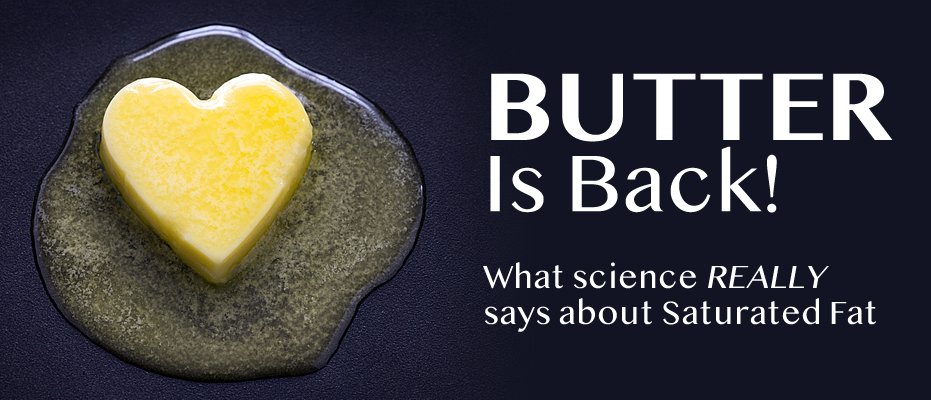The Truth About Saturated Fat
When it comes to food and its effects on your health, don’t rely on the latest headline-grabbers in the media. Rely instead on the real health experts, like the 12 reviewers of this recent paper in Circulation. They’re actually focused on your health, and your health alone.

The title of this superb review, published in the prestigious journal Circulation, is: “Dietary Fats and Cardiovascular Disease: A Presidential Advisory From the American Heart Association.”
It was written by the 12 of the world’s leading scientists in nutrition and heart-health, including Frank Sacks, MD, FAHA, of Harvard School of Public Health Nutrition; Linda Van Horn, PhD, RD, of Northwestern University Preventive Medicine; Lawrence Appel, MD, MPH, of Johns Hopkins University Medicine; Alice Lichtenstein, DSc, FAHA, of Tufts University Cardiovascular Medicine; and Jason Wu, PhD, MSc, of University of Sidney/George Institute for Global Health.
Their 11-page review leaves no stone unturned. Painstakingly and methodically, the dozen experts analyzed all the important scientific literature over the decades on the effects of saturated fat. It encompassed more than 130 randomized controlled trials, observational studies in many human populations, and other clinical studies.
The Truth About Saturated Fat
Their conclusions? They wrote:
“We conclude strongly that lowering intake of saturated fat and replacing it with unsaturated fats, especially polyunsaturated fats, will lower the incidence of cardiovascular disease. This recommended shift from saturated to unsaturated fats should occur simultaneously in an overall healthful dietary pattern such as DASH (Dietary Approaches to Stop Hypertension) …”
DASH, Pritikin Eating Plan
DASH is a diet that strongly resembles the Pritikin Eating Plan. Both diets focus on whole, fiber-rich foods such as fruits, vegetables, whole grains, legumes (beans) as well as prudent servings of lean animal sources like fish, skinless poultry, and nonfat dairy. Both diet plans are also low in sodium.
“Impressive”
This new review on saturated fat is “one of the more impressive evidence reviews I have ever seen,” wrote David L. Katz, MD, MPH, Director of Yale University Prevention Research Center, in an article in Huffington Post titled: “Saturated Fat: Weighed, Measured, and Found Wanting.”
“The authors of this paper are not selling anything,” pointed out Dr. Katz. “They are providing a public service, and the work that went into this paper looks to have been monumental. I have published systematic reviews and meta-analyses; they were painful. This paper takes that effort to a whole new level. To reiterate: read the paper, and see for yourself.”
The Truth About Saturated Fat
Here are a few highlights of the scientists’ conclusions:
-
Saturated fat increases LDL cholesterol, a major cause of atherosclerosis and cardiovascular disease. Replacing saturated fat with unsaturated fat decreases LDL cholesterol, polyunsaturated fat more than monounsaturated fat.
Key sources of saturated fat include: dairy fat (such as butter, cheese, and whole milk); lard; red meat; beef tallow; palm oil, palm kernel oil, and coconut oil.
Sources of polyunsaturated fat include fish; soy products like tofu, soybeans, and most soymilks; flaxseeds and walnuts; and oils such as soybean oil, sesame oil, corn oil, safflower oil. Whole grains, beans, fruits, and vegetables also contain small but adequate amounts of polyunsaturated fats.
-
Randomized controlled trials that lowered intake of dietary saturated fat and replaced it with polyunsaturated fat reduced the risk of cardiovascular disease by about 30%, similar to the reduction achieved by statin treatment.
-
Evidence from prospective observational studies indicates that carbohydrates from whole grains reduce cardiovascular disease when they replace saturated fat.
-
Coconut oil, an oil full of saturated fat but heavily marketed in recent years as healthy, raised LDL cholesterol more than safflower or olive oil in carefully-controlled studies, on par with other saturated fats like butter and beef fat. Given the lack of “offsetting favorable effects, we advise against the use of coconut oil,” the authors wrote.
Summing Up | The Truth About Saturated Fat
When it comes to food and its effects on your health, don’t rely on the latest headline-grabbers in the media. Rely instead on the real health experts, like the 12 reviewers of this latest paper in Circulation. They’re actually focused on your health, and your health alone.
Concurs Dr. Katz of Yale University: “When the net health effects of saturated fat are weighed and measured on scales unbiased by foolishness, fanaticism, and pecuniary motives, they are found wanting.
“All of us wanting the application of just such scales – and a fair accounting of the overall weight of evidence to inform our dietary choices and support our health – owe the authors of this standard-setting paper a debt of gratitude. And just maybe in select cases and the fullness of time – our lives, too.”